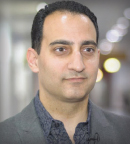The novel, selective BCL2 inhibitor lisaftoclax (APG-2575) has shown activity in the treatment of relapsed or refractory chronic lymphocytic leukemia (CLL) in a phase I study reported at the 2021 ASCO Annual Meeting.1 Preliminary data suggest that lisaftoclax stands out for its favorable safety profile and rapid time to response.
“APG-2575 is well tolerated in doses up to 1,200 mg/d, with infrequent grade 3 to 4 treatment-related adverse events. No tumor-lysis syndrome or dose-limiting toxicity has been observed in this trial, and the maximal tolerated dose has not been reached. The trial suggests proof of concept in these preliminary data, with an objective response rate of 80% in relapsed or refractory CLL and activity in other hematologic malignancies,” said Sikander Ailawadhi, MD, of the Mayo Clinic, Jacksonville, Florida.
“This new drug is a potential alternative for patients with relapsed or refractory CLL and other hematologic malignancies where BCL2 is a driver. It has a shorter daily ramp-up schedule [than venetoclax] that may be more patient-centric and convenient, as well as a preliminary favorable safety profile,” he continued.

Sikander Ailawadhi, MD
Background
Lisaftoclax is a novel, potent, orally active selective BCL2 inhibitor under clinical development. Overexpression of BCL2 allows cancer cells to circumvent apoptosis and prolong their survival. Many hematologic malignancies are characterized by high levels of BCL2, including CLL/small lymphocytic leukemia (SLL), multiple myeloma, and Waldenström’s macroglobulinemia. Venetoclax, the first and only approved BCL2 inhibitor for the treatment of CLL, requires a 5-week ramp-up schedule due to its potential for tumor-lysis syndrome, especially in patients at high risk for this complication. Venetoclax is also associated with thrombocytopenia and severe neutropenia.
In preclinical studies, lisaftoclax selectively targeted BCL2 in various hematologic tumor models. The mode of action of this novel agent is to disrupt the BCL2-BIM complex, mediating induction of apoptosis.
Study Details
The phase I study included 36 patients treated with doses of 20 to 1,200 mg/d of oral lisaftoclax in 28-day cycles. Cohort A included patients with non-CLL hematologic malignancies and a low risk for tumor-lysis syndrome. Lisaftoclax was given without a ramp up to three to six patients at each dose level up to 1,200 mg/d. Cohort B included patients with CLL at intermediate and high risk for tumor-lysis syndrome. Lisaftoclax was given with a 5-day ramp-up, with three to six patients enrolled per dose level up to 1,200 mg/d. The dose-expansion phase includes 9 to 12 patients in each cohort.
Treatment was given daily in 28-day cycles until disease progression or toxicity. All 36 patients had histologically confirmed relapsed or refractory CLL/SLL and other hematologic malignancies as well as adequate hematologic and renal function. Patients were excluded if they had prior treatment with a BCL2 inhibitor or allogeneic hematopoietic stem cell transplantation within the previous year.
The median age of patients was 70 (range, 39–89 years); 52% were 70 or older; 72.2% were male. A total of 14 patients (41.7%) had CLL/SLL. The median number of prior lines of therapy was two (range, 1–13).
Safety Profile
A total of 15 patients did not discontinue therapy at the time these results were presented; 21 discontinued treatment, 13 (62%) for progressive disease, 2 for adverse events, and the rest for a variety of reasons.
“The safety profile was quite favorable,” Dr. Ailawadhi reported.
Treatment-related adverse events of any grade reported in at least 10% of patients included fatigue (28%), neutropenia (22%), diarrhea (20%), and anemia (16%). Grade 3 or higher adverse events reported in greater than 5% of patients included neutropenia, nausea, and decreased platelet count.
“Only one patient discontinued treatment due to treatment-related adverse events, and no grade 5 treatment-related adverse events were reported,” he said.
No dose-limiting toxicities were observed at any dose level up to 1,200 mg/d (the highest level tested). No laboratory or clinical tumor-lysis syndrome was reported. The median treatment duration is six cycles (range, 1–24 cycles).
In cohort B (the CLL and high-risk tumor-lysis syndrome group), 600 mg/d is the recommended phase II dose going forward. “Cohort A still has one slot to be enrolled, and then the maximal tolerated dose will be determined,” noted Dr. Ailawadhi.
Efficacy
Among all 36 patients, there are a few noteworthy points. “A significant proportion of patients are doing great on treatment. Partial response has been seen early in the CLL cohort at the two-cycle mark,” Dr. Ailawadhi stated. In the patients with CLL, the objective response rate was 80%, and the median time to response was two cycles.
“In the non-CLL cohort of other malignancies, there were no partial responses, but clinical benefit was observed in about half of the patients with non-Hodgkin lymphoma. This is a heterogeneous population of heavily pretreated patients with different diagnoses,” he added.
Among the CLL group, eight had stage I or II disease, and eight had stage III or IV disease. Prognostic features included del(17p)/TP53 mutation in 13.3%; del (11q) in 6.7%; CD38-positive in 20%; and unmutated IGHV in 60%.
Dr. Ailawadhi showed slides of a patient with CLL who had high-risk features and a high disease burden who was rapidly cleared in the lymphocytes, nodes, and bone marrow with lisaftoclax. There was no evidence of laboratory or clinical tumor-lysis syndrome in this patient.
DISCLOSURE: Dr. Ailawadhi has received institutional honoraria from Amgen, AstraZeneca, BMS, and Janssen; has served as a consultant or advisor to BeiGene, Celgene, GlaxoSmithKline, Oncopeptides, Sanofi, and Takeda; and has received institutional research funding from Amgen, BMS, Cellectar, Janssen Biotech, MedImmune, Pharmacyclics, Phosplatin Therapeutics, and Xencor.
REFERENCE
1. Ailawadhi S, Chanan-Khan AAA, Chen Z, et al: First-in-human study of lisaftoclax (APG-2575), a novel BCL-2 inhibitor, in patients with relapsed/refractory CLL and other hematologic malignancies. 2021 ASCO Annual Meeting. Abstract 7502. Presented June 7, 2021.

